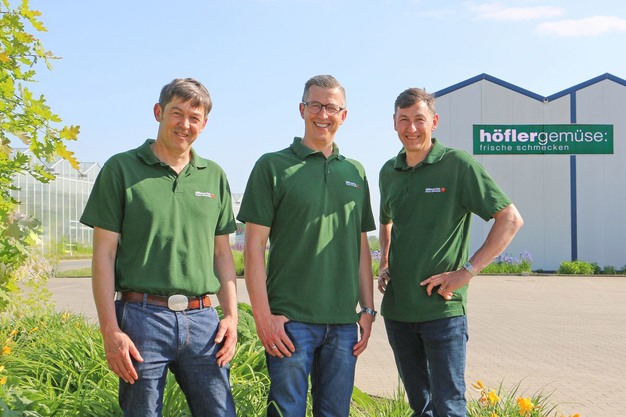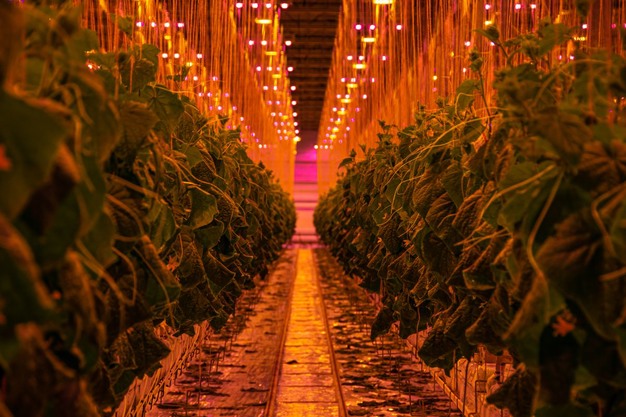"There are many challenges coming our way, which are mainly related to politics," says Simon Höfler from the Höfler Gemüse vegetable farm, located in Nuremberg's Knoblauchsland. "For us, the main problem lies in the energy costs that will hit us in 2024. But then there is the increased CO₂ tax, grid charges, the toll increase, the minimum wage, etc. are causing us considerable worries for the coming season. Since energy costs are already so high, one could actually reduce the grid charges and the CO₂ tax again. After all, the state already receives more revenues from the increased gas price through the value-added tax and the other taxes." He also spoke about his production of mini cucumbers, lamb's lettuce and ginger, as well as the next big challenge for agriculture, which has come from viruses.

Thomas Höfler, Simon Höfler and Peter Höfer, jr. Photo: Gisela Vogler (www.tvsatzstudio.de)
Politics and trade responsible for current situation
Like many other farmers, Höfler also emphasizes that agro-diesel "is the straw that broke the camel's back." Höfler: "We are fed up. I think the current government should face a vote of confidence. However, it must also be said that the current problems cannot only be blamed on the traffic light government. The previous government ultimately bears the blame for the current state of affairs. It seems as if the government can provide money for the whole world but not for its own population."
Good prices, but lower yields
On the other hand, trade cannot be ignored. "The season was quite good, but it was also marked by tough negotiations. We received good prices from trade, but our yields were too low. In the spring, we were plagued by poor tomato yields, while the heavy rainfall in August had a negative impact on the tomato, mini cucumber, and pepper harvest. At least the weather in September was in our favor. Overall, however, we have to say that we had significantly lower yields on average this year, which could not be compensated by a good price."
Various vegetables are cultivated on Höfler's farm on eight hectares of greenhouse area. "Cucumbers are grown on 4.5 hectares, tomatoes on 2.5, and pointed peppers on one hectare. Most of it is sold in the Bavaria region and in some parts of Baden-Württemberg." Furthermore, leeks have also been produced on 15 to 16 hectares for the past two years. "We work with a service provider who cleans the goods for us, after which I can market the goods without a large staff effort."

The Höfler family's greenhouse. Photography: Michael Böllet (www.michaelboellet.de)
Increased demand for field produce
In view of the multiple crises, open-field cultivation has now become more attractive compared to under-glass production. "With open-field production, we won't be able to compensate for everything, but at least we can still generate some profits," Höfler states. Larger investments are generally on hold. "Fortunately, we have already brought our business up to date and modernized everything in the last three to four years. We don't see ourselves under pressure and therefore hold back on new purchases for the time being."
Declining production of lamb's lettuce and ginger
"Due to the energy prices, we have significantly reduced the production of lamb's lettuce. We produce 60 to 80 boxes per day at most, which we sell at the wholesale market. We simply can't compete with Belgian or French lamb's lettuce production anymore," says Höfler. He also estimates that his farm is one of the largest producers of ginger in Bavaria. At the same time, he notices a declining demand for the product. "We started production just before the pandemic. During the pandemic, we were able to achieve good yields with ginger, as the product fit well with the health trend at the time. With this product, however, you can see that consumers are now very much looking at the price." He also noticed that leek production in Knoblauchsland has increased by about 50 percent in recent years, as cultivation has been reduced in other areas of Germany.
Next big challenge: Viruses
He offers mini cucumbers almost all year round. "So far, a lot of energy is still needed for lighting for the production of mini cucumbers. From week 6, we plant the first batches without lighting. Another problem is posed by viruses. The viruses are constantly evolving. We hope that we will receive new resistant varieties from the seed breeders. This is the next big challenge for us."
For more information: Simon Höfler
Simon Höfler
Höfler Gemüse GbR
Spargelfeldweg 1
90425 Nuremberg
info@hoeflergemuese.de
www.hoeflergemuese.de
